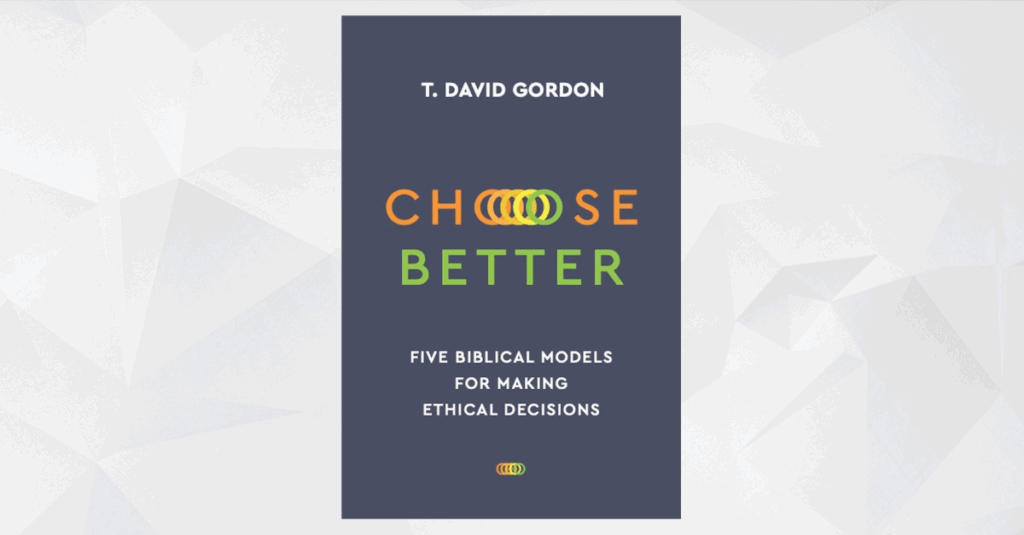Making Better Decisions When Life Isn’t Black and White
September 19, 2025

September 19, 2025
T. David Gordon, Choose Better: Five Biblical Models for Making Ethical Decisions. P&R, 2024. 144 pages.
There are times when the Christian life is black and white, but it’s more often than not somewhere in between. Should I get married? Who should I marry? Should I take this job? Should I attend that school? Should I purchase this car or home? Should I join this church or leave that church? And of course, who should I vote for? (Sorry about bringing that one up, but the issue doesn’t go away, does it?)
Shades of gray induce anxiety. It’s understandable why counselees sometimes want pastors to answer these questions for them. If only pastors knew! There are multiple valid options for many of the decisions we make. Book, chapter, and verse from the Bible always provide us guardrails, but not always a final verdict. Under such circumstances, we must simply choose what seems like the best option and trust God no matter what happens.
T. David Gordon’s book Choose Better is a wonderful guide to making ethical decisions when life gets gray. His “intent is to provide a brief, working discussion of the various major ethical models found in the Scriptures, in the hope that readers will become familiar with them, both conceptually and functionally.” I think he accomplishes his goal.
The five ethical models Gordon offers are as follows:
After an introductory chapter, Gordon dedicates a chapter (about 20 pages) to each of these models. Every chapter gives a biblical argument for one model and explains its strengths and weaknesses. He concludes each chapter with discussion questions and case studies.
How might these models give our members some direction? Imagine that a single lady in your church is nearing retirement age. Her next-door neighbor is angry, threatening, and verbally abusive towards her. Despite her best efforts to live at peace with him, she is under the constant strain of his sinful behavior. For several years, she has done her best to ignore him, but he is getting worse, and the idea of retiring and spending more time at home troubles her greatly. She wants to please God and comes to you, her pastor, for advice about whether she should move. These models give both of you a grid to think and pray through.
Based on the imitation model, you might ask if a decision to move or to stay allows her to emulate God or cultivate human traits that reflect his image. She surmises that if she stays, she could emulate God’s faithfulness and courage in the face of hardship. But if she moves, she could emulate Christ’s example of withdrawing himself from people who rejected him. Nothing conclusive comes from that.
After considering the law model, she does not see a command in Scripture she would violate by moving or staying. The wisdom model, however, helps her foresee that she would likely gain some much-needed calmness if she moved. Moreover, the communion model leads her to believe that moving would be good, as long as she did not move too far from her church family. The warfare model makes her realize that the constant stress of her living situation is why she’s been unable to focus on the ministry that she desires to be involved in. All in all, she concludes that moving to another house would be a good decision.
Gordon’s models can help church members trust one another as they arrive at different conclusions. Two different families considering education options for their children can come to different conclusions about public, private, or homeschooling after asking themselves the same questions from Choose Better. The families can be at rest, knowing that they did what was best for them, though it may not necessarily be best for every family in the world.
When I finished Choose Better, I thought, “How can I expose my church to this resource?” If we could see the various ways that God’s Word helps us make decisions, it would benefit believers who come down on different sides of debatable matters.